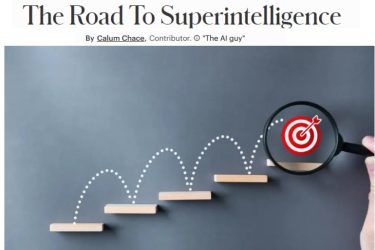Giant cogs are starting to turn

Western governments are finally waking up to the significance of artificial intelligence. It’s a slow process, with much further to go, and most politicians have yet to grasp the significance of AI, but the gradual setting into motion of giant cogs is to be welcomed.
In the November 2017 budget the UK’s Chancellor excitedly announced expenditure of £75m on AI. In March 2018, France’s President Macron put that to shame by announcing a spend of €1.5bn by 2020, primarily to halt the brain drain of French computer scientists. The following month Germany’s Chancellor Merkel declared that Germany would be at the forefront of AI development, although she refrained from quoting any numbers. Shortly afterwards the UK announced a substantial upward revision of its investment, to £1bn, most of it coming from the private sector.
These are large sums of money, but they are modest compared to what the Chinese government is spending. The announcement in January of a $2bn AI industrial park in a mountainous province in the west of the country is just one example of the government’s ambitions. Alibaba’s announcement of $15bn to be invested in AI over three years gives a better idea of the scale of China’s activity.
China’s declared aim is to overtake the US as the predominant provider of AI development by 2030, and it has made astonishing progress in the short time since its “Sputnik” moment in March 2016, when DeepMind’s AlphaGo beat the world’s best human Go player. It now attracts more VC investment into AI firms than the US, for instance.
The US presents a curious dichotomy. Its tech giants still dominate the AI landscape: Google, Facebook, Amazon, Microsoft and Apple are increasingly AI companies, and they are the largest companies in the world (followed immediately by Alibaba and Tencent). Astonishingly, Amazon spends on R&D half of what the whole of the UK spends – including all UK government departments, all UK companies, and all the UK’s universities and NGOs. But the US government seems blithely unaware of the growing importance of AI. When Facebook founder Mark Zuckerberg was grilled by the US Senate in April, the senators revealed how little understanding they had of what kind of company it is. And the US president is too busy reassuring unemployed coal miners that he will bring their jobs back to have noticed the likelihood of massive waves of job disruption from machines.
The “Three Wise Men” moment

Still, the big picture is that politicians are slowly waking up to the importance of AI. It is reminiscent of the “three wise men” moment in 2014, when Stephen Hawking, Elon Musk and Bill Gates all declared that strong AI is probably coming, and will either be the best or the worst thing ever to happen to humanity. The initial result was pictures of the Terminator all over the newspapers, but fairly soon a more balanced discussion emerged.
If the giant cogs of the government machines are indeed finally beginning to turn, that is to be welcomed. We need politicians and policy makers to be fully engaged if we are to grasp the amazing opportunities that AI offers – and to meet the serious challenges it poses. We need governments to help train AI researchers and engineers, to engage with the tech giants on issues such as privacy and bias, and to regulate them if necessary. Above all, we need governments to prepare for the possibility of technological unemployment.
These activities are not zero-sum between countries. Humanity will get the best out of AI only if it collaborates across borders. That is the natural inclination of scientists and business people, but not necessarily of voters and governments. And so the nascent discussion about AI and government is being framed as a race. Does that actually make any sense?
It’s not a race…

The most profoundly influential technology of the last decade was arguably the smartphone – itself powered increasingly by AI. The race to sell them was won by Apple, which earns almost all of the profit in the smartphone industry. But that does not mean that only Americans benefit from smartphones: they have become essential tools for fully half the world’s population – they are constant companions for people in all countries and at all income levels. The same will be true of new forms of AI: self-driving cars and digital assistants, for instance. As soon as they are ready for prime time they will spread around the planet like the rising sun.
Of course the governments and citizens of the countries which produce the most financially successful AI companies will benefit the most from their tax payments, and their workforces will benefit most from the ecosystem of jobs and skills they build. But building companies (and universities) is not a fixed-term process where a winner surges through the tape to claim the prize and everyone else loses. Assuming we meet and overcome the challenges that AI poses, when country A produces more and better AI, the people in countries B, C and D are beneficiaries too.
…but there is a duopoly

The idea of leadership in AI is less incoherent than the idea of an AI race. The problem here is the bizarre failure by politicians to recognise the enormous difference in scale between the AI activities of different countries. Leaders in the UK, France and Germany all declare their countries to be leaders in AI, whereas the truth is they are bit players compared to the duopoly of China and the US. The report published by the UK’s House of Lords in April was a refreshing exception: “vague statements about the UK “leading” in AI are unrealistic and unhelpful, especially given the vast scale of investment in AI by both the US and China.”
The lords went on to propose a more nuanced role for the UK. Citing its strong tradition of computer science research (Alan Turing, among many others), successful startups (notably DeepMind), globally respected institutions like the BBC and the British legal system, they suggested the UK could help “convene, guide and shape the international debates which need to happen.”
Even setting aside the question of how much harm Brexit is doing and will do to Britain’s standing in the world, is this noble vision realistic? Perhaps it is – but probably only so long as there are no serious and lasting differences of opinion between the world’s regions about how AI should evolve. If China cleaves to its view that the privacy of individuals is of little account compared to the safety of society at large – and the power of the communist party – then why should they listen when self-appointed leadership organisations in the UK and elsewhere tell them otherwise? Certainly, they will have to obey the rules of the countries they sell their products and services in, but consumers in those countries will demand the latest and the best technology, wherever it originates, and they may not look kindly on governments that get in the way.
Senior figures within the EU are now talking about investing €20bn into AI, but there is no realistic prospect yet of that happening. Absent such a massive change, it is hard to see why effective leadership in ethical frameworks will reside anywhere other than the same place as the leadership in R&D and commercial implementation. And that is in the AI duopoly of the US and China.


